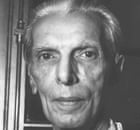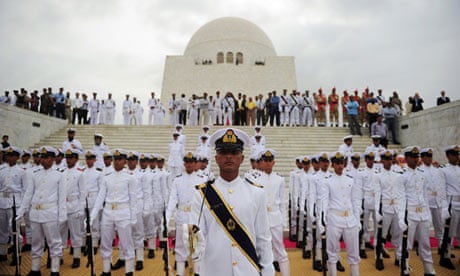For Pakistan's broadcasters, no celebration of the country's 65th birthday would be complete without Muhammad Ali Jinnah. Every few minutes, usually in a burst of graphics, images of the tall, gaunt lawyer who managed to carve the country out of British India in 1947 takes over the screen.
After a few seconds of grainy black and white footage of the man known as the Quaid-i-Azam, or "great leader", the viewer is returned to presenters wearing suitably patriotic green clothes and reports about the day's events, including military parades and the festooning of Islamabad's major public buildings with spectacular quantities of lights.

Missing, however, is a speech he made at the first meeting of Pakistan's constituent assembly, three days before the creation of the state. Yet this is regarded by many as the most important Jinnah moment of all.
For it has become a touchstone for liberals aghast by the state of Pakistan, which they fear is increasingly intolerant of its minorities, including Hindus, Christians and Ahmadis, who regard themselves as a sect of Islam but are legally banned from calling themselves Muslims.
"You may belong to any religion, caste or creed – that has nothing to do with the business of the state," Jinnah told the gathering on 11 August 1947.
Murtaza Solangi, director general of Radio Pakistan, said the speech had become a "dividing line between the forces who want Pakistan to go in a particular direction".
"Those who want it to be a sectarian or communal or Islamic state don't recognise this speech and never talk about it," he said. "And [for] those who want Pakistan to be an inclusive Muslim state where people are free to practise their faith and not discriminate on basis of religion this is kind of rallying cry."
Solangi has been on a quest to find a recording of the speech, which even in text form was ignored for decades, particularly during the 1980s when the country's leaders actively sought to create a more Islamic society.
While state broadcaster Radio Pakistan has an almost complete library of Jinnah speeches, his call for a secular Pakistan is absent. No one has a copy. Both the BBC and All India Radio were asked to check their archives, but nothing was unearthed.
There are near-daily reminders that Pakistan has struggled to live up to Jinnah's ideals. Hindu leaders cite killings, abductions and forced marriages, warning that many Hindus have had enough and are trying to leave the country.
Last week, hundreds of Hindu pilgrims who attempted to travel to India were held up at the border after the government feared they would claim asylum. Despite assuring they would not, several crossed the border and promptly announced to Indian reporters their intentions never to return to Pakistan.
Solangi said if a copy of Jinnah's speech was ever found and broadcast it would be "huge" because in the ongoing struggle about what sort of place Pakistan should be his voice would be "galvanising".
"It is not easy to discredit Jinnah, the founder of the country," he said.
